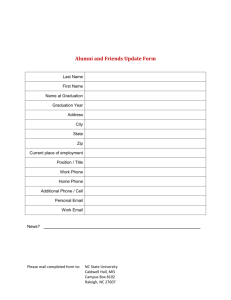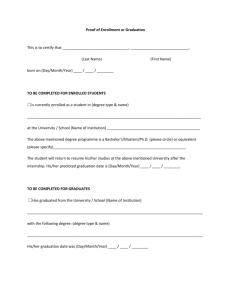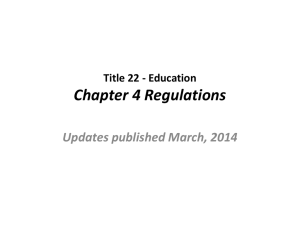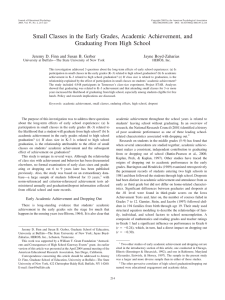The many ways that college is different from high school
advertisement
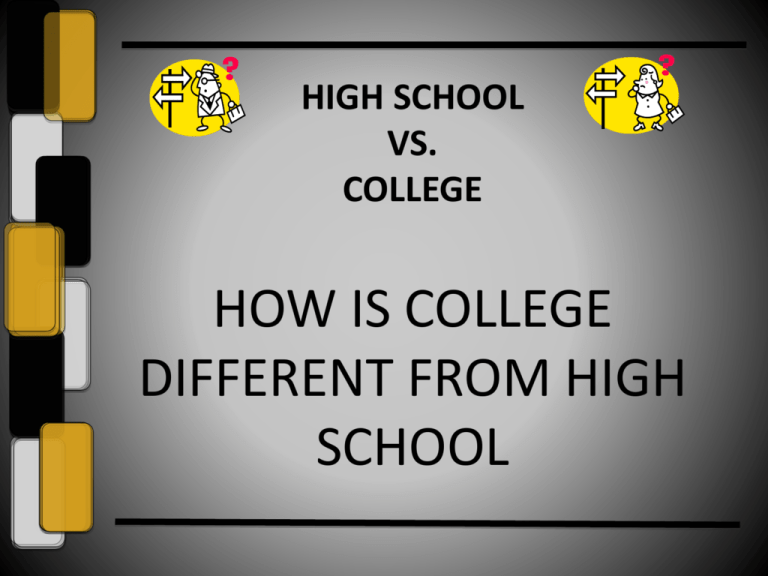
HIGH SCHOOL VS. COLLEGE HOW IS COLLEGE DIFFERENT FROM HIGH SCHOOL HIGH SCHOOL VS. COLLEGE HOW IS COLLEGE DIFFERENT FROM HIGH SCHOOL High School College It is mandatory and usually free It is voluntary and there is a cost - tuition. Follow a school-directed schedule and proceed from one class to another. Individual students must manage their own time and schedules. General education classes dictated by State/district requirements. Classes based on field of study; requirements vary, and number of units may vary. Typically a school year is 36 weeks long; some classes extend over both semesters. Summer classes may be offered but are not used to accelerate graduation, Academic year is divided into three quarters. Courses are offered fall, winter, and spring quarters. Summer quarter may be used to accelerate graduation. HIGH SCHOOL VS. COLLEGE HOW IS COLLEGE DIFFERENT FROM HIGH SCHOOL CLASSES continued… High School College Class attendance is usually mandatory and monitored closely. Attendance policies may vary with each instructor. Lack of attendance will impact performance. Classes generally have no more than 30-35 students. Classes may have 100 or more students. Text books are typically provided at little or no expense. Textbooks can be expensive. An anticipated range for a full-time student is ($200-$400 per quarter). Guidance is provided for students so that they will be aware of graduation requirements. Graduation requirements vary for different fields of study. Student is responsible for monitoring their progress and seeking advice. HIGH SCHOOL VS. COLLEGE HOW IS COLLEGE DIFFERENT FROM HIGH SCHOOL STUDYING High School College Students may study outside of class as little as 1-2 hours per week, and this may be mostly last-minute test preparation. Students need to study at least 2-3 hours outside of class for each hour in class. Students seldom need to read anything more than once, and sometimes listening in class is enough. Students need to review class notes and text materials regularly. Use time between classes carefully. Expected to read short assignments that are discussed and re-taught, in class. Students are assigned substantial amounts of reading and writing which may not be directly addressed in class, but may be covered on tests. HIGH SCHOOL VS. COLLEGE HOW IS COLLEGE DIFFERENT FROM HIGH SCHOOL TESTING High School College Frequent, covering small amounts of material. Testing is usually infrequent and may be cumulative, covering large amounts of material. A particular course may have only 2 or 3 tests in a quarter. Make-up tests are often available. Make-up tests are seldom an option and may have to be requested. Test dates can be arranged to avoid conflicts with other events. Usually, scheduled tests are without regard to other demands. Frequently conducts review sessions emphasizing important concepts prior to test. Faculty rarely offer review sessions, and when they do, they expect students to come prepared with questions. HIGH SCHOOL VS. COLLEGE HOW IS COLLEGE DIFFERENT FROM HIGH SCHOOL GRADES High School College Given for most assigned work. May not be provided for all assigned work. Good homework grades may assist in raising overall grade when test grades are low. Tests and papers provide the majority of the grade. Initial test grades, especially when low, may not have adverse effect on grade. Grades on tests and major papers usually provide most of the course grade. Graduation requirements may be met with a grade of D or higher. Requirements may be met only if the student’s average meets the departmental standards.
